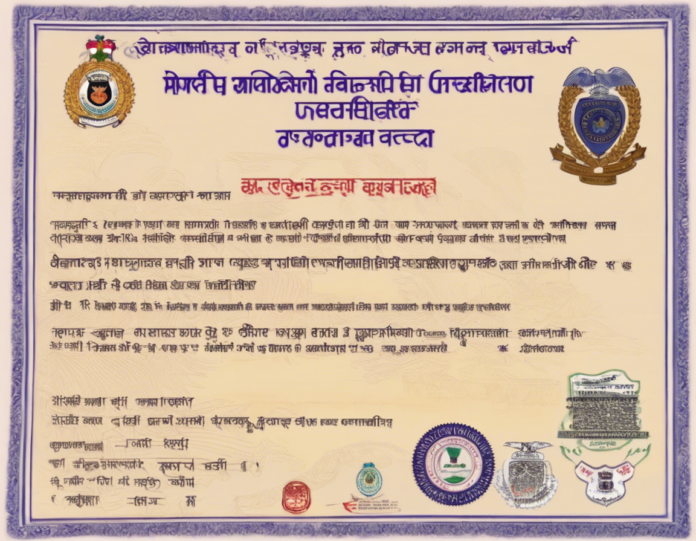Introduction
Police verification is a crucial step in various processes such as acquiring a passport, employment, tenancy, immigration, and more. Police verification certificates are documents that validate an individual’s criminal record (if any) or background check. Without a clear understanding of the police verification process, individuals may face delays or denials in their applications. In this comprehensive guide, we will delve into the police verification certificate process, its importance, types of police verification, how to apply, and FAQs to provide you with all the necessary information.
Types of Police Verification
The police verification process can vary based on the purpose and requirements. There are generally three types of police verification:
1. Passport Police Verification: This is a standard procedure conducted by the passport office to verify the applicant’s criminal record and personal details before issuing a passport. The police visit the applicant’s residence to verify the information provided in the passport application.
2. Employment Police Verification: Employers often require police verification certificates as part of the hiring process to ensure the candidate has a clean record and is trustworthy. This may involve checking with local police stations or law enforcement agencies.
3. Tenant Police Verification: Landlords or housing societies may request tenant police verification certificates to ensure the safety and security of their property and other tenants. This process involves verifying the tenant’s background and criminal history.
Importance of Police Verification
Police verification is essential for maintaining security and ensuring the safety of individuals and communities. Here are some key reasons why police verification is important:
-
Preventing Crime: Police verification helps prevent individuals with criminal backgrounds from obtaining passports, jobs, or residences, thus reducing the risk of crime.
-
Safety and Security: Verifying the credentials of individuals through police checks enhances safety and security within neighborhoods, workplaces, and communities.
-
Regulatory Compliance: Many government agencies, employers, and landlords are required by law to conduct police verification to comply with regulations and safeguard the interests of the public.
How to Apply for a Police Verification Certificate
The process of obtaining a police verification certificate may vary depending on the purpose and jurisdiction. However, the following are general steps to apply for a police verification certificate:
1. Identify the Purpose: Determine why you need a police verification certificate (e.g., passport, employment, tenancy) as different purposes may require specific documentation or procedures.
2. Visit the Nearest Police Station: Contact the nearest police station or the designated authority responsible for conducting police verifications in your area.
3. Fill Out the Application Form: Provide accurate personal details such as name, address, contact information, and the purpose of the verification in the application form.
4. Submit Required Documents: Prepare and submit the necessary documents such as identity proof, address proof, application form, photographs, and any other relevant documents as specified.
5. Schedule Verification Visit: Once the application and documents are submitted, the police authorities will schedule a visit to your residence or workplace for verification.
6. Cooperate with Authorities: During the verification visit, cooperate with the police officials, provide accurate information, and ensure all inquiries are answered truthfully.
7. Await Certificate Issuance: After the verification process is complete, the police will issue a police verification certificate based on the findings. This certificate can be used for the intended purpose.
FAQs (Frequently Asked Questions)
1. What is the validity of a police verification certificate?
– The validity of a police verification certificate may vary depending on the issuing authority and purpose. In most cases, it is valid for a specific period (e.g., six months to one year).
2. Can I apply for a police verification certificate online?
– Some jurisdictions offer online applications for police verification certificates. Check with your local police department or the concerned authority for online application procedures.
3. How long does the police verification process take?
– The duration of the police verification process can vary based on the workload of the authorities, the complexity of the case, and other factors. It may take a few days to a few weeks in general.
4. What happens if adverse information is found during the verification process?
– If adverse information is found during the verification process, the authorities may further investigate the matter. Depending on the severity of the findings, it may impact the outcome of the application.
5. Is police verification mandatory for all applications?
– Police verification is not mandatory for all applications, but it is a common requirement for various purposes such as passport issuance, employment, tenancy, visa applications, etc.
Conclusion
In conclusion, understanding the police verification certificate process is crucial for individuals applying for passports, jobs, accommodations, or other purposes that require background checks. By following the necessary steps, providing accurate information, and cooperating with the authorities, applicants can ensure a smooth verification process and obtain the required certificate. Police verification plays a significant role in maintaining security, preventing crime, and upholding regulatory standards in various sectors. Stay informed, be prepared, and comply with the verification procedures to fulfill your objectives effectively.








